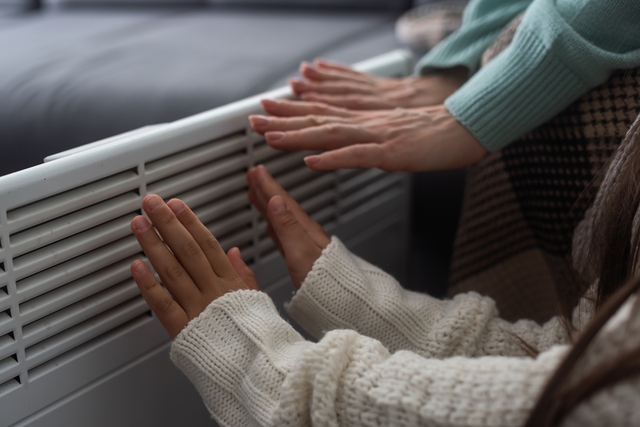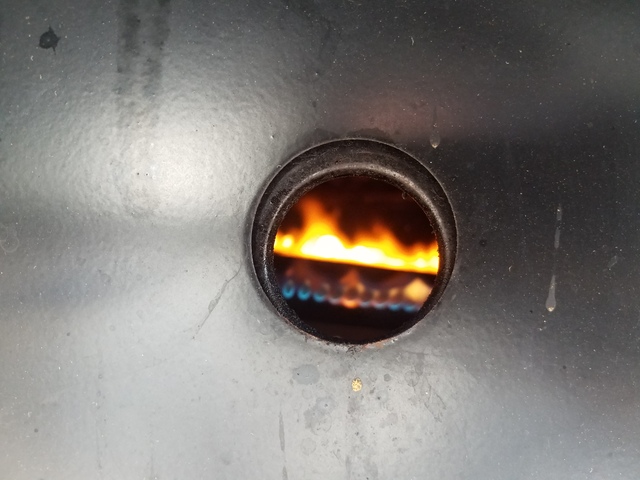As the winter season approaches, we shift our attention to the warmth and comfort of our homes. When we do everything we can think of to achieve a cozy indoor environment, this will often bring up concerns about rising energy bills.
We are here to help our residential and commercial customers in Ocean and Monmouth County understand their heating systems better—particularly gas furnaces—and how to optimize their furnace efficiency.

Beachwood Air is known for our prompt, reliable, and affordable HVAC installation, heating and furnace repairs, and maintenance, and we often share practical advice on how homeowners can ensure their furnace is running at peak efficiency. From simple maintenance tasks you can perform yourself to the benefits of scheduling a professional tune-up, we can help.
How Gas Furnaces Work And Impact Furnace Efficiency
A gas furnace, at its most basic level, works by using natural gas as fuel to generate heat. The process begins when the thermostat in your home sends a signal to the furnace that the temperature has dropped below a certain point. This causes the gas valve in the furnace to open, allowing gas to flow into the combustion chamber. Here, the gas mixes with air and is ignited by the pilot light or an electronic ignition.
The heat generated from this combustion warms up the heat exchanger, a metal component designed to resist high temperatures. As the heat exchanger warms, your furnace’s blower fan pushes the cold air from your home over it, thereby heating the air before it’s redistributed through your air ducts back into your living spaces.
Importance of HVAC Systems in Maintaining Indoor Air Quality For Furnace Efficiency
The role of your HVAC system in maintaining good indoor air quality cannot be overstated. It does more than just circulate warm air throughout your home during the chilly winter months. It also filters out pollutants, allergens, and other harmful particles from the air.
One of the key components responsible for this filtration process is the furnace filter. Regularly changing your furnace filters is one of the most effective furnace maintenance tips we can provide. Over time, these filters collect dust and other airborne particles, which can restrict airflow if not cleaned or replaced regularly. This can lead to increased heating costs and a decrease in the overall efficiency of your heating system.
Keep in mind, that a dirty or clogged filter can cause the furnace to overwork, leading to potential mechanical problems and even the release of carbon monoxide, a dangerous and odorless gas. Therefore, maintaining clean filters is also critical for your safety.
Another way to improve indoor air quality and reduce heating bills is to ensure your air ducts are clean and free of leaks. Leaky ducts can cause heated air to escape before it reaches your living spaces, causing your furnace to work harder than necessary and increasing your heating costs.

Optimizing Furnace Efficiency During Winter
Winter is a time when your furnace works the hardest. The chilly weather demands constant and efficient heating to keep your home warm and cozy. However, without proper maintenance and optimization, your furnace can struggle to keep up with the demands of the season. Here are some tips to ensure that your furnace performs at its best during winter.
Regular maintenance is the key to maintaining an efficient furnace. It’s advisable to schedule a professional inspection before the onset of winter. A trained technician can identify and fix any potential issues that may hinder the furnace’s performance. This includes cleaning the furnace, checking for leaks, testing safety controls, and ensuring that all components are working properly.
Replace Filters
Dirty or clogged filters restrict airflow, forcing your furnace to work harder than necessary and decreasing its efficiency. It’s recommended to replace or clean your filters every 1-3 months during the heating season. Shop for your furnace filter here >
Seal Ductwork
Leaky ducts can lead to a significant loss of heated air. Sealing your ductwork can prevent this loss, ensuring that the heat produced by your furnace reaches your living spaces effectively. You can use mastic sealant or metal tape to seal any visible gaps or cracks in your ductwork. View our ductwork services >
Proper Thermostat Settings
Smart or programmable thermostats can optimize your furnace usage by adjusting the temperature according to your daily routine. Lowering the temperature when you’re not home or when you’re sleeping can save energy without compromising comfort.
Insulate Your Home
Good insulation keeps the warm air inside your home and the cold air out. Check your windows, doors, and walls for any drafts or leaks and seal them. Also, consider insulating your attic and walls to prevent heat loss.
When Is It Time To Call A Pro To Improve Furnace Efficiency In The Winter Season
Winter is a season of celebration, but it can quickly turn into a time of discomfort if your furnace starts acting up. While regular maintenance and minor troubleshooting can be done by homeowners, there are instances when it’s best to call in the professionals. Here are some signs that it’s time to pick up the phone and get professional help for your furnace during winter.
Unusual Noises
While no furnace is completely silent, you should be concerned if it starts making strange noises. Bangs, pops, rattles, or squeals can indicate mechanical issues. If these noises persist, it’s best to call a professional to diagnose and fix the problem.
Inconsistent Heating
If you notice inconsistent temperatures throughout your home, it could be a sign of a malfunctioning furnace. This could be due to issues with the ductwork, thermostat, or the furnace itself. A professional can accurately determine the cause and provide the necessary solutions.
Rising Energy Bills
If your energy bills are suddenly and significantly higher without a corresponding increase in usage, your furnace might be working harder than it should be to heat your home. This could indicate a lack of efficiency, which a professional can assess and improve.
Frequent Cycling
Frequent cycling between the “On” and “Off” modes can indicate a problem with your furnace. This could be due to a bad thermostat, improper air circulation, or an oversized furnace. A professional can identify the issue and recommend the appropriate fix.
Yellow Pilot Light
A properly functioning furnace should have a blue pilot light. If it’s yellow, it could indicate a serious problem like a carbon monoxide leak. If you notice a yellow pilot light, call a professional immediately.
Taking Good Care Of Your Furnace: Promoting Furnace Efficiency
The importance of maintaining your furnace and HVAC system cannot be overstated. Regular maintenance, proper filter replacement, ductwork sealing, appropriate thermostat settings, and good insulation are key to optimizing furnace performance and energy efficiency, especially during the cold winter months.
Be mindful of signs of potential furnace problems such as unusual noises, inconsistent heating, escalating energy bills, frequent cycling, and a yellow pilot light. In such scenarios, don’t hesitate to call in a professional. Remember, preventative measures and timely intervention can save you from discomfort, high energy costs, and potential health hazards.
